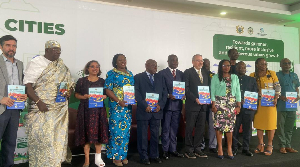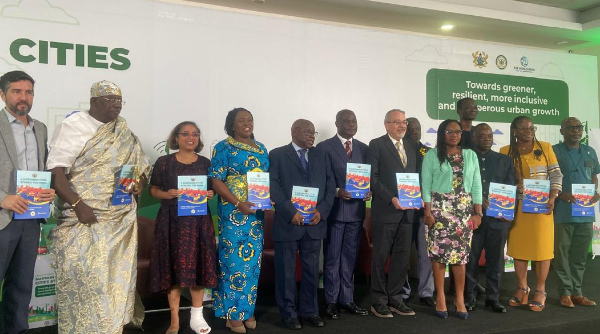 A group photo of participants at the launch of the Ghana Sustainable Cities Strategy
A group photo of participants at the launch of the Ghana Sustainable Cities Strategy
The Minister of Local Government, Chieftaincy and Religious Affairs, Ahmed Ibrahim, has emphasised that achieving sustainable urban development in Ghana cannot rest solely on the shoulders of government, but rather requires a collective societal effort.
He made the remarks during the official launch of the Ghana Sustainable Cities Strategy (GSCS) in Accra on June 4, 2025, organized in collaboration with the World Bank.
The GSCS is a national policy framework designed to guide Ghana’s urban transformation towards greener, more inclusive, resilient, and economically vibrant cities.
Under the theme “Towards Greener, Resilient, More Inclusive and Prosperous Urban Growth,” the strategy aims to address the growing challenges of urbanization while unlocking the economic and social potential of urban spaces.
Ahmed Ibrahim stressed the need for a multi-stakeholder approach to Ghana’s urban transformation.
“Sustainable urban development cannot be achieved by government alone, It requires a societal approach, the active participation of metropolitan, municipal and district assemblies, traditional authorities, and religious leaders.”
The minister outlined some strategic focus areas of the GSCS:
1. Targeting rapidly growing urban areas with tailored interventions to address unsustainable growth patterns.
2. Investing in high-impact sectors such as solid waste management, urban mobility, land management, and affordable housing.
3. Mobilizing local and private capital by strengthening mechanisms for local revenue generation and attracting private investment for urban infrastructure and services.
4. Enhancing coordination and partnerships among local government, traditional authorities, civil society, and development partners.
Dr Robert Tailiercio, Division Director for Ghana, Liberia, and Sierra Leone at the World Bank, highlighted the urgency of Ghana’s infrastructure needs and urban vulnerabilities.
“Ghana’s infrastructure plan for 2019 estimates a staggering $37 billion investment is needed by 2037 to support economic growth and improve quality of life,” he said.
“That’s 40 times the government’s current capital budget.”
He added that urban flooding poses a significant risk to both people and property, particularly in informal settlements.
“More than 5.5 million people live within one kilometer of the shoreline and are vulnerable to coastal flooding. Annual losses from flood damage exceed $20 million, making it one of the highest in Sub-Saharan Africa.”
Dr Tailiercio also pointed to the importance of accelerating the implementation of key infrastructure projects like the Garret Flood Protection Project.
Alfred Gaisie, Municipal Chief Executive for Korle Klottey Municipal Assembly, shared his vision for financial sustainability at the local level.
“The assembly has projected that by the end of 2029, 80% of funding for its local development interventions should come from internally generated funds,” he said.
Deputy Minister of Local Government, Rita Naa Odoley Sowah, called on development partners to support the strategy’s implementation, especially in financing.
“We implore our partners to consider the financial strategy outlined in the GSCS and support the government’s efforts for inclusive and sustainable urban development,” she said.
KA
